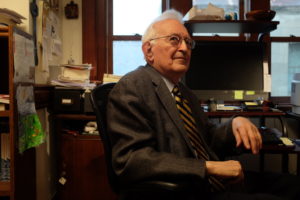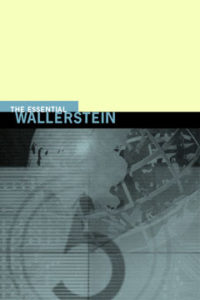Immanuel Wallerstein (28 September 1930 – 31 August 2019), the political sociologist best known for his writings on the “world system” and I were friends in the mid 1950s. Perhaps not close friends but at least both student activists in the world federalist/world citizen movement, especially in their international dimension. We shared a common analysis of situations and were largely in agreement as to the short-term steps to be taken. I would not say we influenced each other, but rather that we shared a common approach coming from different directions. Our shared interest in Africa as the early 1960s brought independence and later there was a focus on what Manny (as he was known by his friends) called the “world system” and I “the world society.” After the late 1950s, we rarely saw each other, but we continued to exchange offprints of our articles instead of Christmas cards at the start of the year.

We were roughly at the same stage in our university education. Although Manny was four years older, he had spent 1951 to 1953 in the US Army. When we started working together in 1954, I was a student at Princeton and he was finishing an MA at Columbia in New York City. He wrote his thesis on McCarthyism and the negative role that Senator Joseph McCarthy had played in American life, and especially on intellectual freedom. We agreed that McCarthyism was to be fiercely combated and that students could take a lead in keeping open discussions in university life.
Our main focus of common action was the international student movement. Shortly after the end of the Second World War in 1945, the Soviet Union helped to organize a number of international student and youth movements and largely took control of them. The student movement was called the International Union of Students (IUS) and the broader youth movement was called the World Federation of Democratic Youth (WFDY). For about three years, Western European and US youth groups had tried to participate fully but were less well organized than our Soviet and Eastern European movements. Thus, after 1948 and the Communist government coming to power in Prague, Western and US students broke away and created rival international unions. The Western students formed the International Student Conference with its headquarters in Leiden, Netherlands, and a broader youth grouping called the World Assembly of Youth (WAY).
When Manny and I started working together in 1954, I had been elected President of the Young Adult Council (YAC) of the National Social Welfare Assembly. YAC was a coalition of US youth groups and of youth oriented service organizations such as the YMCA. YAC was the U.S. member of WAY, of which Manny was elected Vice-President in 1955. Both of us became involved in the international student movement, providing an alternative view to the Communist line of the rival movements without assuming the voice of the primitive anti-communism McCarthy had embodied. Then again, McCarthy’s approach was relatively widespread in US government circles.
It wasn’t until 1967 that information concerning the CIA financing of WAY (through YAC) became public knowledge. At the time, I myself was unaware. The funds came through a New York foundation linked to a large manufacturing firm that could readily have had access to the amounts of money that we were sending to WAY headquarters. In fact, I knew the director of the foundation well, he was an intelligent man who often attended our council sessions. A few years later, he became the director of a well-known modern art museum in the south of France, probably without CIA money. However, at the time, the Soviets considered modern art as subversive of “socialist realism in art” paintings of happy tractor drivers, so one never knows!
Through the international youth movements, Manny and I became interested in the sociopolitical currents in African colonies that were on the eve of independence. At the time, WAY was the only international non-governmental organization that had African colonies as full members. In WFDY, the colonies were only associate members. Manny went on to write his PhD dissertation contrasting the policies of Ghana and the Ivory Coast, an English and French colony of similar size and geographic location.
The leader of the Gabonese section of WAY became independent Gabon’s first Minister of Education, and he asked me to come work with him. I did so until he was pushed out of the government in 1963 and replaced by a personal enemy. I then left for Geneva to help set up a program to train African civil servants.
In the late 1960s, Manny published a good number of articles on African political currents. I was helping to edit an academic journal on modern Africa called Genève-Afrique and would sometimes send articles to Manny for his evaluation prior to publication.
By the early 1970s, both Manny and I came to realize that the new African states were not going to change the world system in a positive direction. We had both come full circle in our focus, returning back to where we had started in the world federalist/world citizen movement with a desire to look at the world as a whole.

In 1976 Manny created the Fernand Braudel Center for the Study of Economics, Historical Systems and Civilizations at the University of New York at Binghamton, a center he directed until his retirement in 1999. Manny was a good organizer, and the Braudel Center became a cottage industry for books with a World System approach. It wasn’t just Wallerstein’s multi-volume The Modern World System, but rather a whole series of books using a similar approach.
André Schiffrin, who had represented the International Socialist Youth Movement in YAC back in the 1950s, became a well-known New York publisher first at Pantheon and later at his own publishing house, The New Press. Most of Manny’s more recent books were published at The New Press including The Essential Wallerstein, released in 2000.
Looking back at our lives as activists and writers, there was probably a certain parallel growth of realism as we saw movements from which we had expected great things being weaker, more divided, and more often manipulated from outside than we had initially thought. So comes to mind a line of Manny’s: “People resist exploitation. They resist as actively as they can, and as passively as they must.”
Author bio
Rene Wadlow is President of the Association of World Citizens.
